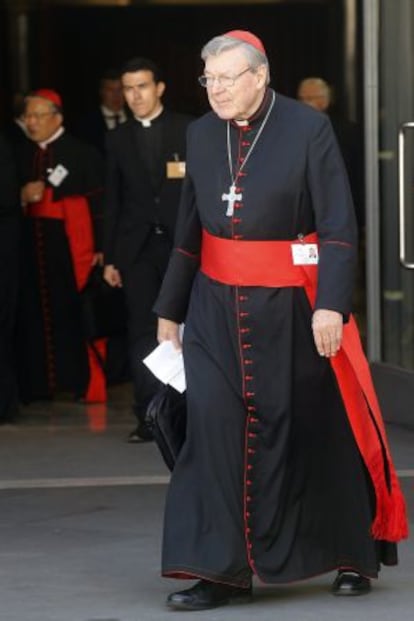Vatican finds hundreds of millions off the books
The pope’s minister of economy reveals details of fiscal chaos within the Holy See

Not one, two or three...The Vatican has discovered “hundreds of millions of euros hidden in various accounts within different departments” and in its own bank, the always controversial “Istituto per le Opere di Religione” (IOR). The news does not come from a new mole in the style of Paolo Gabriele, Benedict XVI’s disloyal butler who aired out the state’s huge ball of dirty laundry in mid-2012 but from Australian Cardinal George Pell himself, Prefect of the Secretariat for the Economy of the Holy See. The former archbishop of Sydney did not reveal how the Vatican Bank, which canceled 3000 suspicious accounts in June, had come into that fortune or why the account holders were able to escape oversight.
According to the economy minister’s remarks to the British weekly, Catholic Herald, when - on Pope Francis’ orders - he began to wreak havoc at the bank, he discovered that, contrary to what they believed, the institution was not on the verge of bankruptcy. “In fact, we have discovered that the situation is much healthier than it seemed, because some hundreds of millions of euros were tucked away in particular sectional accounts and did not appear on the balance sheet.”
Although Pell admits that “unscrupulous” figures had taken advantage of the Vatican’s “financial naïvety” for decades to launder dirty money, the explanation he offers for this surprising discovery is different, though not too innocent. “Congregations, Councils and, especially, the Secretariat of State enjoyed and defended a healthy independence,” he said. “Problems were kept ‘in house.’ Very few were tempted to tell the outside world what was happening, except when they needed extra help.”
In the language of Borgo Pío, the neighborhood near the Vatican where cardinals would take in good meals until Pope Francis established the menu of the day, this explanation brings up two equally troubling questions. The first is that the Church’s families are more protective of its banking secrets than confession. Only now and only reluctantly, in light of Pope Francis’ threat to call the guards, have they revealed their respective - and in some cases well-endowed - bank accounts.
Let us not forget that one of Jorge Mario Bergoglio’s first initiatives was to clean up the Vatican’s dubious financial record. According to the pope, the bank had to meet international standards of transparency as well as make sure its activities followed the guideline of the Church: “A poor church for the poor.” And, “a Church for the poor should not be poorly managed,” as Cardinal Pell stressed in his interview.
The second question is no less striking, especially since the admission comes from the Vatican’s highest financial authority. “The Curia was following models that had been consolidated in the past. Just like kings gave their regional leaders, princes and governors a free hand as long as the books were balanced, popes did the same with the cardinals of the Curia as do the bishops of dioceses today.” A mess that some, like the already famous Monsignor Nunzio Scarano who was arrested in June 2013 for money laundering, knew how to exploit.
Which is why the pope established the Secretariat for the Economy at the beginning of this year. The department’s mission is to oversee and reorganize all economic activities by the Holy See and Vatican City State. Pell, one of the eight cardinals who formed the so-called G-8 group to reform the Church - though State Secretary Pietro Parolin later joined in - had to take charge of finances. And one of the first things that drew the attention of this Australian in Rome was that a humble butler, Paolo Gabriele, “could enjoy such free access to such sensitive information for years,” a privilege which led to a massive scandal dubbed as Vatileaks.
Cardinal Pell is convinced that those dark days are over and that the Vatican’s current financial situation is, despite its $24 million deficit, like that “of a 21st century state.”
Translation: Dyane Jean François
Tu suscripción se está usando en otro dispositivo
¿Quieres añadir otro usuario a tu suscripción?
Si continúas leyendo en este dispositivo, no se podrá leer en el otro.
FlechaTu suscripción se está usando en otro dispositivo y solo puedes acceder a EL PAÍS desde un dispositivo a la vez.
Si quieres compartir tu cuenta, cambia tu suscripción a la modalidad Premium, así podrás añadir otro usuario. Cada uno accederá con su propia cuenta de email, lo que os permitirá personalizar vuestra experiencia en EL PAÍS.
¿Tienes una suscripción de empresa? Accede aquí para contratar más cuentas.
En el caso de no saber quién está usando tu cuenta, te recomendamos cambiar tu contraseña aquí.
Si decides continuar compartiendo tu cuenta, este mensaje se mostrará en tu dispositivo y en el de la otra persona que está usando tu cuenta de forma indefinida, afectando a tu experiencia de lectura. Puedes consultar aquí los términos y condiciones de la suscripción digital.









































